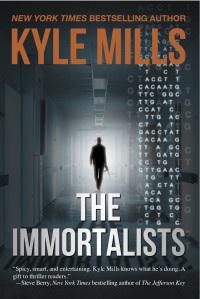Don’t ever want to die?
Thinking about your mortality is like wrinkles and the propensity to start sentences with “these kids today”—just another unavoidable aspect of getting older. But, in my case, it also led to interesting questions about the inevitability of aging.
With the incredible technological advances I’ve seen in my forty-five years, why do I have to suffer through it at all? I mean, I don’t hack novels out on a manual typewriter like my predecessors. I no longer have to carefully apply tinfoil to my TV antenna in order to catch an episode of Kojak. Yet I still have to listen to myself whine about my increasingly bad back—complaints that are often barely audible over the alarming crunching sound coming from elbows I trashed over twenty years of rock climbing.
And so when it came time to write my latest thriller, I found myself returning to this subject.
Aging isn’t as inevitable as many people think. Lobsters, for instance, just keep going until they get sick, injured, or dipped in butter. With old age being the number one killer of people worldwide, why couldn’t we borrow a few crustacean genes and spare ourselves?
It turns out that the science of aging is progressing at an ever-accelerating rate. We’ve discovered that calorie restriction can slow the process and that removing dying cells can prevent mice from developing cataracts, wrinkles, and muscle wasting. Or maybe it would be easier to just build replacement parts from our own cells and keep swapping them out?
There are stranger solutions, too. If the human brain is nothing more than a computer made of meat, why not just download our minds into a simulation? We’d be young and beautiful forever, living in a world of unlimited resources and infinite possibilities. Want to own a mansion, climb Mt. Everest, and eat ten gallons of ice cream in a single sitting? Go ahead. Angry with your husband for denting your virtual Ferrari? Kill him with a chainsaw. He’ll just pop back into existence a few seconds later no worse for the wear.
More interesting than the science, though, are the social ramifications. What about overpopulation? Would we still need God? What if immortality was too expensive for all but the wealthiest people? Would our existence become less life and more a tedious, endless avoidance of death? Do we need an expiration date to motivate us to get up in the morning?
The wonderful thing about change on this scale is that it can very easily turn into chaos. And chaos makes for great stories.
THE IMMORTALISTS
Richard and Carly Draman’s daughter Susie has only a few years left to live. Afflicted with progeria, a rare disease that causes premature aging, Susie is expected to die before her thirteenth birthday. Microbiologist Richard has devoted himself to raising money to fund research into a cure, but by the time Susie is eight years old, he must face the fact that the money—and her time—are quickly running out. Richard unexpectedly receives a visit from the widower of a recently deceased fellow researcher whose radical work unraveling the fundamental secrets of life just may hold the key to a cure for Susie. Soon after, Richard is charged with industrial espionage by the pharmaceutical company that funded the research. Knowing he has stumbled onto something big, he turns for help to old friend Burt Seeger, a retired special-forces operative. Together, Seeger and the Dramans set out to track down the shadowy forces trying to silence them.. But their quest is rife with danger and betrayal, as they enter a battle between two powerful factions vying for control of a discovery that could change the face of humanity—and save one little girl’s life.

Kyle Mills is the author of eleven political crime thrillers. His provocative novels have earned international acclaim as well as the praise of Tom Clancy, Vince Flynn, David Morrell, and Lee Child. Mills’ initial inspiration for his novels was his father’s career as a former FBI agent and director of Interpol, and it is those familial connections with international law enforcement that lend striking realism to his work.
http://www.kylemills.com
Advertisement